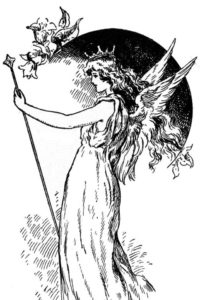One of the biggest decisions to be made, when we started planning this vacation, was whether to see a show at the RSC or the Globe. I know, I know, people are screaming “Both!” at the screen right now, but let’s just agree that real-world considerations (time, money, not wanting to push my luck dragging my family to *too* much Shakespeare…) won out, and there would be one show.
But which? The Royal Shakespeare Company (RSC), if you’re not familiar, is in Stratford-upon-Avon, while Shakespeare’s Globe is in London. We planned to visit both cities, so we had a choice. People may wish to discuss my broad strokes here, but the way I figure it my choice came down to:
- The RSC is where you see the best Shakespeare in the world. Depending on when we go we might even get to see some big-name Hollywood actors (and then maybe see them afterward at The Dirty Duck). The downside to that is if you’re not a reasonably serious fan of Shakespeare, the difference between “this is an outstanding show” and “I don’t understand what’s going on” will probably become apparent quickly.
- Shakespeare’s Globe is intended as a tourist attraction, an exact recreation of the Globe as it was in Shakespeare’s day. You’ll sit where and how Shakespeare’s audience sat (right down to paying extra for a cushion), you’ll see his plays performed on his stage. I do not expect this to be the greatest Shakespeare I’ve ever seen. I expect this to be more of a “package deal” where the “Wow, we’re actually here!” factor plays heavily.
We decide to see a show at the Globe. Specifically, A Midsummer Night’s Dream. My family is reasonably familiar with that one, and it’s a raucous comedy, so worst case scenario we’re all laughing ourselves silly all night. There are worse things.
The whole area of the city around the Globe is apparently loaded with historical landmarks, and I would have loved to go visit them all, but time was not on our side. We’d started the vacation with three days of nothing but Shakespeare, and now that we were in London and had a few Shakespeare free days, I didn’t think my family was in the mood to chase me around the streets of London just to see random “Here’s where a certain building stood 400 years ago!” signs.
I did, however, see something on the map that says “Shakespeare Mural.” I had no idea what that was and wanted to find it. I thought I had an idea? Turns out it was much, much better than I was expecting…

I hate that the tuba guy is there (even though his instrument was a flamethrower). But others have told me he adds character to the picture, so what can you do?
We get to the theatre early enough to sit around and have a drink, but not early enough to catch the last tour. That was my fault, I was riding that “I will not ask my family to do more Shakespeare stuff” thing harder than I should have, and by the time I mentioned the tour and they said, “Let’s go on it!” we’d missed it. Ah, well.
I take the opportunity while we’re sitting in the cafe to stuff a bunch of Shakespeare Geek stickers in with the napkins. I wonder if anybody found them? 🙂
We get inside, and at last, we’re here (with cushions!) There’s a pretty strict “no pictures while anyone is onstage” policy, which I saw enforced, so here’s the only picture I got:

That piñata hanging there tells the theme, which I’ll come back to in a moment.
We open as expected with Theseus and Hippolyta. Hippolyta is portrayed as an animal, literally shipped here in a box, bound and gagged and barely able to speak the language. The best way I can describe Theseus is … Eric Idle, from Monty Python. Trust me. If you’ve ever heard Eric Idle speak (and you no doubt have, he’s done a zillion voiceover things), this is our Theseus. He’s afraid of Hippolyta, he’s here for comic effect. Which is not a stretch, because as I soon learn, pretty much everything is here for comic effect. Everything is over the top, play to the audience.
We meet our youths, we get our plot, we head for the forest. Cue the fairies! Remember that piñata theme? In comes this New Orleans-style parade of monstrosities, like a cross between a walking pinata and that new show The Masked Singer. Some have really long draggy arms, some have weird monster eyes. Titania is not done up like that, she looks more like she’s straight out of Mardi Gras.
Our Puck is interesting. The costuming is nothing special, just a t-shirt and some deely-bopper antennae, but there’s a reason for that. The entire cast plays Puck. Huh? It took me a while to realize that they weren’t just doubling. As far as I could tell, at one point or another pretty much every member of the cast donned a Puck t-shirt for a scene or at least part of a scene. For the scene where Puck is looking for the flower (“I go, I go; look how I go, Swifter than arrow from the Tartar’s bow.”) it worked well, like he’d cloned himself to go that many times faster. But in a later scene, the various Pucks are actually competing with each other to finish his lines. Definitely entertaining, but I’m not sure there was a bigger message or just a cool gimmick.
The funniest gimmick, speaking of, is the audience member they brought up on stage as one of the Mechanicals. This poor chap (Simon) mostly stood there, uncomfortable, while the cast all played off him like an improv game. And it was hysterical. At intermission my kids said to me, “Would you go up there if they grabbed you?” and I told them, “Yes, but I probably wouldn’t be as funny, because I’d be trying to play along with the play as I know it. The fact that this guy doesn’t know the play is half the fun.” When Bottom is translated and everybody runs away screaming, Simon just stands there. Even I’m in the audience yelling, “Run away, Simon! Run away!” And then Bottom gave him the cue: “Why do they run away? (run away, Simon! run away!) this is a knavery of them to make me afeard….” and he ran away.
Now let’s talk about Bottom, because if there’s something I didn’t like about the play, this was it. Not the actress’ performance, that was fine. I mean, there was nothing at all deep going on, just 100% playing to the audience. I’m talking about how obscene it got.
We talk about the dirty jokes in Shakespeare. We know that he had to deliver what the audience wanted, and we know that this troupe is playing up to that angle. But when you’ve got this many kids in the audience, I wonder about some of the decisions made…
Though it’s typically pointed out that Bottom is just given an ass’s head, he’s not completely transformed into a donkey, this time he’s done up head to toe in one of those piñata costumes so it’s hard to tell. Doubly so when he (I’m going to keep saying he, although it’s an actress playing the role, for reasons that are about to become obvious) reaches down between his legs and pulls out this…well, this long thing that’s dangling. I wonder whether that’s supposed to be a tail, then I remember that only his head is a donkey and think, “Oh, dear. Please don’t let the kids ask me about this.” We then see that there is a flute at the end of it, upon which he plays a tune. Then, just to drive the point fully home, he looks right at a member of the audience and says, “Whistle cock.”
(Sidebar – I thought, “Huh??? Why don’t I remember this?” and when I was able, I went back to the script:
I will walk up
and down here, and I will sing, that they shall hear
I am not afraid.
Sings
The ousel cock so black of hue,
With orange-tawny bill,
The throstle with his note so true,
The wren with little quill,–
*sigh* I guess? Maybe that’s a one-off joke? Oh, how mistaken I was about to be.
Let’s just jump to where Titania and Bottom meet, and she’s taken by the size of his … instrument. She tries (?) to play her own tune on it, does so poorly, then announces, “It’s been a while” and moves on. I’m wondering at that point whether she was as uncomfortable as the parents in the audience. Not to mention any music teachers, who were no doubt thinking “That’s not what you do with your tongue.”
Don’t worry, it gets worse. You know that scene where Bottom is just fully into the whole “Ok, I guess these fairies are going to do everything I tell them” thing? This whole scene has taken place in a big dumpster, by means of a prop. It’s where Titania originally fell asleep, it’s where she takes him for whatever it is they’re doing, and it’s where they are when the fairies are … waiting on him. Except whatever they’re all doing to him is rather exciting. Building to a climax, even. Suddenly a jet of some unidentified liquid comes shooting forth! Everybody gets uncomfortable (nay, grossed out) and the scene continues.
There’s more of that sort of humor, but that was the worst of it. In the big scene at the end, when Wall comes out (played by a woman), you can make a guess where they decided to put the chink that Pyramus and Thisbe have to put their lips against. Stuff like that. I don’t want to sound like a prude. My kids are old enough now that they understood what was going on. And it’s not like I saw many 10yr olds running around among the groundlings. Shakespeare and people could do bawdy. I just didn’t expect it to be quite so graphic.
Overall it was exactly what I expected (except for the obscene parts). It was all about the audience, all about making sure they get the joke and laugh. Nothing was subtle. My family enjoyed it, that’s the important part. We got to see the Globe. Quality of performance aside, I think that if I’d chosen RSC at the expense of not seeing the inside of the Globe, I would have regretted it.
One quick story before I go! We had excellent seats, front row of the top section. We filled the row except for one seat, taken by this young woman who was there by herself. She told us that she’s a graduate student (though not in Shakespeare), and that her studies allow her to get to London regularly enough that she’s been to see a show at the Globe four times. She apparently had some sort of social media presence of her own, because when I saw her trying to take a bunch of selfies and offered to get a picture for her, she told me that the selfie angle was part of her signature style. But she did have me take a few. She then took a few of my family, which came out nice but of course I can’t post here. She said she’d never been to Stratford, so I pulled out some pictures we’d taken earlier in the week, and she was suitably jealous. 🙂
Before leaving I gave her one of my Shakespeare Geek stickers. Never did catch her name, but if you ended up following me and you’re reading this, hello!
 So I was thinking today about a future where we have people on the moon. You know, typically Friday afternoon stuff. Like you might read in a Robert Heinlein novel. I was talking about the next generation being the ones who might live on the moon, who might be the first to perform Romeo and Juliet on the …. wait a second.
So I was thinking today about a future where we have people on the moon. You know, typically Friday afternoon stuff. Like you might read in a Robert Heinlein novel. I was talking about the next generation being the ones who might live on the moon, who might be the first to perform Romeo and Juliet on the …. wait a second.





 My daughter turned on the television this weekend and asked me, “What’s
My daughter turned on the television this weekend and asked me, “What’s